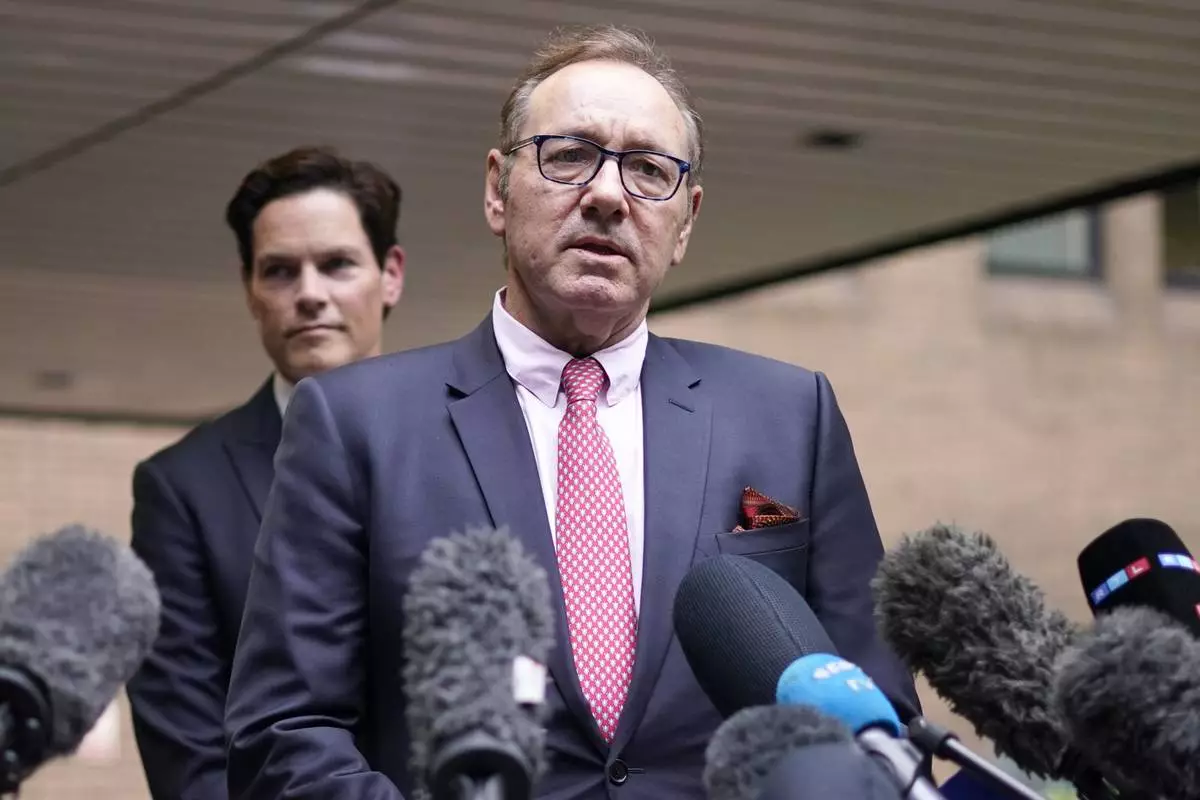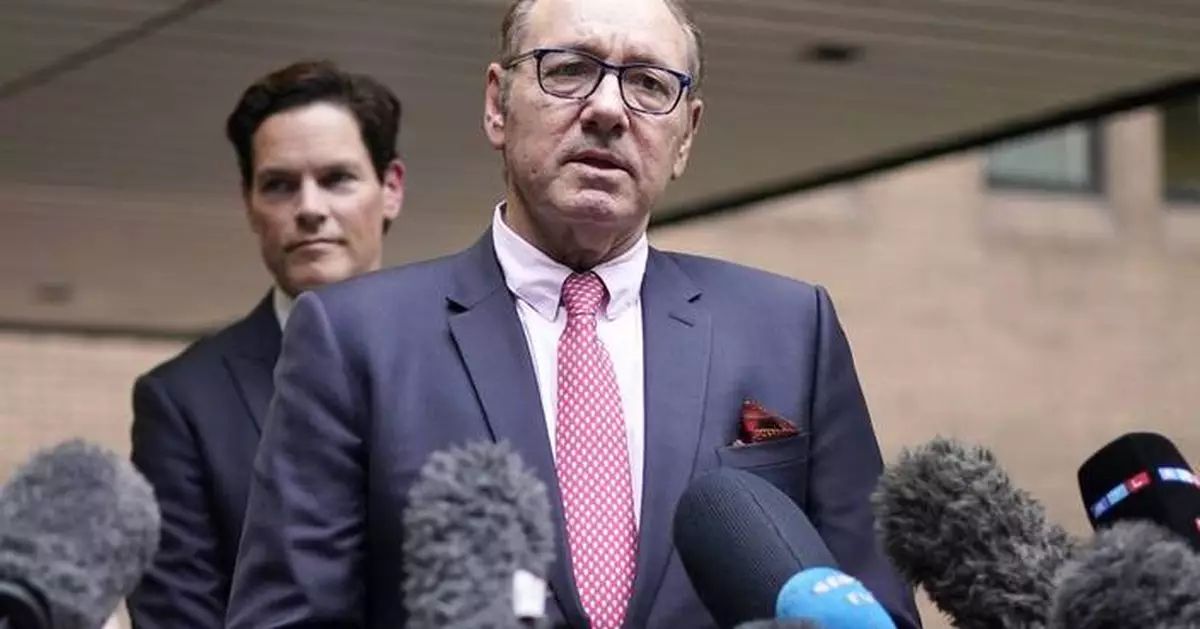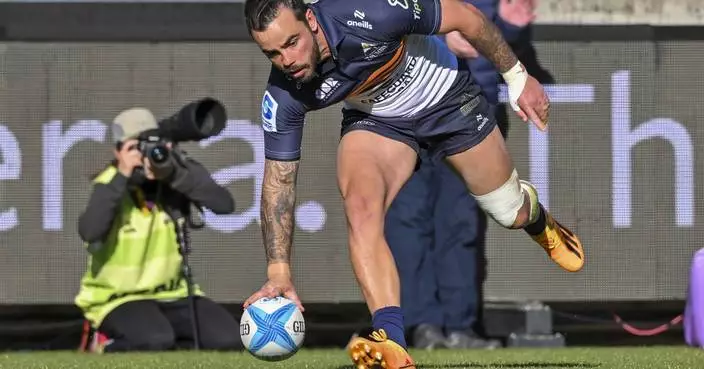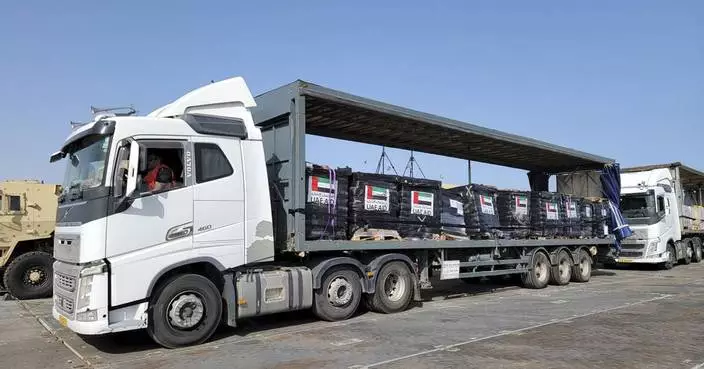LONDON (AP) — Kevin Spacey, the Oscar-winning actor, has denied new allegations of inappropriate behaviour from men who will feature in a documentary on British television that is due to be released next week.
In an online interview with journalist Dan Wootton, Spacey said he has never done anything illegal and admitted that he has struggled to get back to work after being acquitted last year of criminal charges in a London court.
“I can’t go through this again, allowing myself to be baselessly attacked without defending myself," he said in the interview entitled “Kevin Spacey: Right Of Reply” which was aired late Friday on Wootton’s YouTube channel.
Last July, a London jury acquitted Spacey on sexual assault charges stemming from allegations by four men dating back 20 years. The court victory was his second since he saw off a $40 million lawsuit in 2022 in New York brought by “Star Trek: Discovery” actor Anthony Rapp.
The documentary “Spacey Unmasked” is set to be aired on May 6 and 7 on Channel 4 in Britain and streamed on Max in the U.S.
The documentary is said to feature testimony from men regarding events between 1976 and 2013, the actor revealed during the interview.
“I take full responsibility for my past behaviour and my actions, but I cannot and will not take responsibility or apologize to anyone who’s made up stuff about me or exaggerated stories about me,” said Spacey, who won Academy Awards for “The Usual Suspects” and “American Beauty”.
“I’ve never told someone that if they give me sexual favors, then I will help them out with their career, never," he added.
Spacey, who served as artistic director of the Old Vic Theatre in London from 2004 to 2015, again admitted that he was a “flirt” with men in their 20s and that he made “clumsy” passes at times.
“I’ve clearly hooked up with some men, who thought they might get ahead in their careers by having a relationship with me," he said. "But there was no conversation with me, it was all part of their plan, a plan that was always destined to fail, because I wasn’t in on the deal.”
The actor also claimed on X, formerly Twitter, that he had “repeatedly requested” that Channel 4 give him more than seven days to respond to the allegations made about him in their documentary.
Spacey said the broadcaster refused “on the basis that they feel that asking for a response in 7 days to new, anonymized and non-specific allegations is a ‘fair opportunity’ for me to refute any allegations made against me.”
“Each time I have been given the time and a proper forum to defend myself, the allegations have failed under scrutiny and I have been exonerated,” he added.
Spacey said he has struggled to get back to work after being acquitted of all criminal charges, describing his experience as a “life sentence.”
His acting career has been adversely affected since 2017 when he was first publicly accused of inappropriate behaviour at the beginning of the #MeToo movement. He then lost his lead role as Frank Underwood in the Netflix drama “House of Cards”.
Channel 4 has been contacted for comment.

FILE - Actor Kevin Spacey addresses the media outside Southwark Crown Court in London, Wednesday, July 26, 2023. Spacey, the Oscar-winning actor, has denied new allegations of inappropriate behavior from men who will feature in a documentary on British television that is due to be released on May, 6-7, 2024. (AP Photo/Alberto Pezzali, File)
RIO DE JANEIRO (AP) — A 20-minute drive separates the historic Maracana Stadium from the Complexo do Alemao, one of Rio de Janeiro's most impoverished and violent favelas.
One of its residents, 15-year-old soccer player Kaylane Alves dos Santos, hopes her powerful shots and impressive dribbles will allow her to cover that short distance from slum to stadium in three years to play for Brazil's national team in the final of the 2027 Women's World Cup.
That chance, once remote, became more realistic on Friday when FIFA members voted to make Brazil the first Latin American country to host the Women's World Cup.
Local organizers have suggested that both the opening match and the final are likely to be played at the 78,000-seat Maracana Stadium that staged the final matches of the 1950 and the 2014 men's soccer World Cups.
Teenager dos Santos knows the hurdles for her to ever play for Brazil remain enormous — in 2027 or later. She doesn't have a professional club to play for, she only trains twice a week, and her nutrition is not the best due to limited food choices in the favela.
Most importantly, she often can't leave home to play when police and drug dealers shoot at each other in Complexo do Alemao.
Still, she is excited and hopeful about Brazil hosting the Women's World Cup, resulting in a big boost to her confidence.
“We have a dream (of playing for Brazil in the Women’s World Cup), and if we have that chance it will be the best thing in the world,” dos Santos told The Associated Press this week after a training session in the Complexo do Alemao.
She and about 70 other young women in the Bola de Ouro project train on an artificial grass pitch in a safe region of the 3-square kilometers long (1.15 square mile) community.
If not on the pitch, Dos Santos and her teammates will be happy enough just to attend games of a tournament they could only dream of watching up close until FIFA members voted for Brazil over the Germany-Netherlands-Belgium joint bid. The Women's World Cup was played for the first time in 1991 and will have its 10th edition in 2027.
A five-time champion in men's soccer, more than any other country, Brazil has yet to win its first Women's World Cup trophy. By then, it is unlikely superstar Marta, aged 38, will be in the roster. Dos Santos and thousands of young female footballers who have overcome sexism to take up the sport are keen to get inspiration from the six-time FIFA player of the year award winner and write their own history on home soil.
As many female footballers experience in Brazil, dos Santos and her teenage teammates rarely play without boys on their teams. Until recently, they also had to share the pitch with five-year-old girls, which didn't allow the older players to train as hard as they would like.
“(The Women's World Cup in Brazil) makes us focus even more in trying to get better. We need to be able to play in this,” said 16-year-old Kamilly Alves dos Santos, Kaylane's sister and also a player on the team. “We need to keep training, sharing our things."
Their team, which has already faced academy sides of big local clubs like Botafogo, is trained by two city activists who once tried to become players themselves.
Diogo Chaves, 38, and Webert Machado, 37, work hard to get some of their players to the Women's World Cup in Brazil, but if that's not possible they will be happy by keeping them in school.
Their non-profit group is funded solely by donations.
“At first, basically, the children wanted to eat. But now we have all of this,” said Chaves, adding that the project began three years ago. “We believe they can get to the national team. But our biggest challenge is opportunity. There's little for children from here, not only for the girls.”
Machado said the two coaches “are not here to fool anyone” and do not believe all the young women they train will become professionals.
“What we want from them is for they to be honest people, we all need to have our character,” Machado said. “We want to play and make them become nurses, doctors, firefighters, some profession in the future."
The two dos Santos sisters, as do many of their teammates, believe that reaching the Women's World Cup as Complexo do Alemao residents is possible. Brazil has more than 100 professional women's soccer teams, with other players living in favelas, too.
But it won't be easy.
“Sometimes I have to cancel appointments because of shootings, because there’s barricades on fire,” she said. “Sometimes police tell us to go back home, they say we can’t come down and point their guns to me, to my mother,” said Kamilly.
Her sister hopes the pair will overcome the violence, against the odds.
“I want to earn my living in soccer, fulfill all dreams," Kaylane says. "And I want to leave the Complexo do Alemao. I want to make it happen.”
AP soccer: https://apnews.com/hub/soccer

An overhead view of the pitch where young women take part in a soccer training session run by the Bola de Ouro social program at the Complexo da Alemao favela in Rio de Janeiro, Brazil, Thursday, May 16, 2024. (AP Photo/Silvia Izquierdo)

Agatha smiles during a soccer training session run by the Bola de Ouro social program, at the Complexo da Alemao favela in Rio de Janeiro, Brazil, Thursday, May 16, 2024. Young women are participating in soccer programs led by community trainers, where they receive both sports and personal development training. (AP Photo/Silvia Izquierdo)

Agatha strikes a ball during a soccer training session run by the Bola de Ouro social program, at the Complexo da Alemao favela in Rio de Janeiro, Brazil, Thursday, May 16, 2024. Young women are participating in soccer programs led by community trainers, where they receive both sports and personal development training. (AP Photo/Silvia Izquierdo)

Young women ready breakfast for fellow participants as part of a soccer training session run by the Bola de Ouro social program, at the Complexo da Alemao favela in Rio de Janeiro, Brazil, Thursday, May 16, 2024. Young women are participating in soccer programs led by community trainers, where they receive both sports and personal development training. (AP Photo/Silvia Izquierdo)

Relatives watch a soccer training session for young women run by the Bola de Ouro social program at the Complexo da Alemao favela in Rio de Janeiro, Brazil, Thursday, May 16, 2024. Young women are participating in soccer programs led by community trainers, where they receive both sports and personal development training. (AP Photo/Silvia Izquierdo)

Young women and their coach Dioguinho bring it in for a team huddle at the start of a soccer training session run by the Bola de Ouro social program, at the Complexo da Alemao favela in Rio de Janeiro, Brazil, May 16, 2024. Young women are participating in soccer programs led by community trainers, where they receive both sports and personal development training. (AP Photo/Silvia Izquierdo)
















